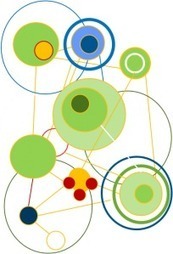Fritjof Capra, in his book ‘The Hidden Connections’ applies aspects of complexity theory, particularly the analysis of networks, to global capitalism and the state of the world; and eloquently argues the case that social systems such as organisations and networks are not just like living systems – they are living systems. The concept and theory of living systems (technically known as autopoiesis) was introduced in 1972 by Chilean biologists Humberto Maturana and Francisco Varela.
This is a complete version of a ‘long-blog’ written by Al Kennedy on behalf of ‘The Nature of Business’ blog and BCI: Biomimicry for Creative Innovation www.businessinspired...
Via ddrrnt, Spaceweaver, David Hodgson, pdjmoo, Sakis Koukouvis



 Your new post is loading...
Your new post is loading...








Fritjof Capra, in his book ‘The Hidden Connections’ applies aspects of complexity theory, particularly the analysis of networks, to global capitalism and the state of the world; and eloquently argues the case that social systems such as organisations and networks are not just like living systems, they are living systems. This parallel relationship between nature and technical complex systems Kelly describes as “vivi-systems” and he proposes that the “world of the made will soon be like the world of the born: autonomous, adaptable, and creative but, consequently out of our control. ” The hyper connection and web of life we can now experience through the use of digital tools and platforms will allow us to circumnavigate the old paradigm and develop for the collective greater good.
So how can we look to nature and use Biomimicry to help us optimise our groups and organisational communications to create real value in our social networks, to build or shape networked businesses that are built for resilience?
A great resource in the Decision Intelligence for Sustainability space.
YOU ARE INVITED TO FOLLOW MY NEWS AGGREGATES @pdjmoo
▶ CLIMATE CHANGE http://www.scoop.it/t/changingplanet
▶ BIODIVERSITY http://www.scoop.it/t/biodiversity-is-life
▶ OUR OCEANS http://www.scoop.it/t/our-oceans-need-us
▶ OUR FOOD http://www.scoop.it/t/agriculture-gmos-pesticides